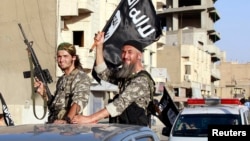Islamic State militants surprised many when they stormed across northwestern Iraq, capturing large swaths of land and the city of Mosul without much of a fight. The success added to the group’s carefully broadcast image of a relentless and powerful force. The militants relied heavily on local Sunnis, including former Baathists who felt marginalized after years of repressive Shi’ite rule. And that could prove to be their Achilles heel.
Islamic State militants, guns in hand, constantly broadcast images of their triumphant and brutal takeover of northwestern Iraq. It is part of a carefully designed propaganda campaign that has propelled them to world attention.
What is missing from the pictures is the crucial role played by local Iraqi Sunnis, including members of former leader Saddam Hussein’s Baathist army. Without them, said Col. Joel Rayburn, a military research fellow at the National Defense University, the Islamic State would not have succeeded in capturing so much territory so fast.
“The Islamic State needs the Iraqi Sunnis. They need popular support amongst the Iraqi Sunnis, or they can’t survive, they can’t survive in Iraq without that,” said Rayburn.
Saddam's army
The core of ISIS or ISIL, as the Islamic State group also is known, is made up of Syrians and Iraqis, including lower level Saddam-era military officers who were conservative Salafi Islamists.
Saddam’s army, the strongest state institution in Iraq before the American invasion in 2003, was disbanded in May that same year by Paul Bremer, the U.S. authority in Iraq at the time.
In the view of many analysts, it was the single greatest mistake made by the United States in Iraq, creating an unemployed pool of 400,000 armed men who were then quickly recruited by Sunni and Shi’ite extremists.
Since then, successive Shi’ite-dominated governments and the Kurds have kept Sunnis out of power and disenfranchised them even on local levels. Islamic State has been quick to exploit those grievances.
Now, Rayburn said, some top-level generals who were part of Saddam’s army are making tactical deals with the militants in order to return to power in Iraq. There are divisions in Iraq’s large Sunni community, though, about whether that is the best approach.
“You are talking about a debate within the Sunni community about whether to align tactically with the Islamic State in some places, in the near term, in order to achieve near-term political goals, and then turn on the Islamic State on down the road, or whether to turn on the Islamic State now,” said Rayburn.
Possible rift
Baathists have tended to be secular nationalists, ideologically at odds with the Islamic Group's aim of establishing a Muslim caliphate.
Rayburn noted that his views do not necessarily reflect those of the U.S. Defense Department.
Hoping to turn the Sunni tide of support, Washington and the international community pressured former Shi’ite prime minister Nouri al-Maliki to step down. Maliki was seen as a deeply sectarian figure.
Iraq’s new Prime Minister Haider al-Abadi has formed a new, more inclusive government in an attempt to unify the country and oust the militants with international support.
The Islamic State group has proven itself formidable, however, and as it consolidates its hold in Syria and Sunni areas of Iraq, there is growing concern it easily will reach into neighboring Jordan, the West Bank and Lebanon.
And the militants are actively recruiting internationally, leading to concern they are training fighters who can then return to their countries of origin, and potentially carry out operations in the West.













